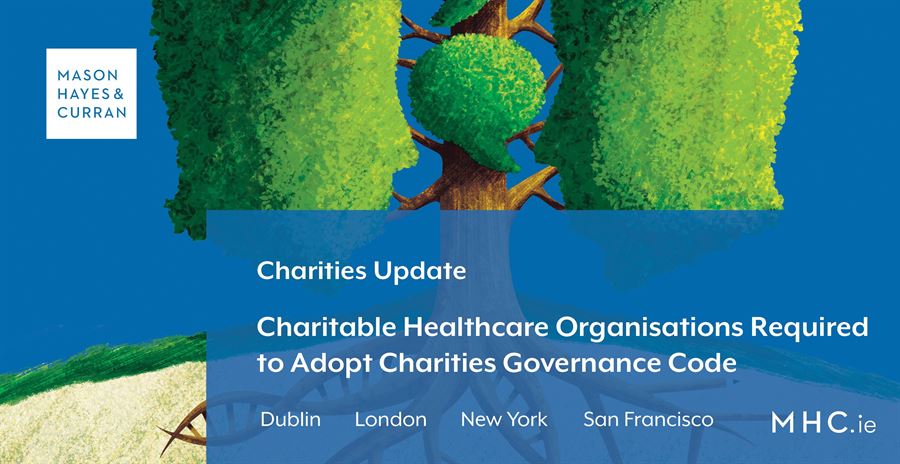
At a time when many healthcare organisations are overrun dealing with the current pandemic, some other members of staff have time on their hands. It may be that those staff members have the skills to assist in compliance with the Charities Governance Code.
Does my healthcare organisation have to comply with the Code and when does it need to report on compliance?
Many healthcare organisations are also registered charities and have annual reporting obligations to the Charities Regulatory Authority (CRA). All charities are required to comply with the CRA’s Charities Governance Cogde in 2020 and report on compliance in 2021. The Code impacts how charities operate, how they govern themselves, and how they demonstrate compliance to the CRA. In fact, the CRA has already begun asking charities to confirm in their 2019 report if the charity commenced the implementation of the Code in 2019, with a view to contacting those who wish to participate in a review and feedback exchange regarding implementation. The CRA intends to consider the approach early adopters take with the Code to drive forward best practice.
What does the Code comprise?
The introduction of the Code is a significant development for the sector, and the amount of work involved in bringing your charity into compliance should not be underestimated. The Code is centered around six “principles” of governance, each which has an accompanying set of core standards which operate on a “comply or explain” basis. These require the charity trustees of every charity to ensure that the charity is:
- Advancing its charitable purpose
- Behaving with integrity
- Leading people
- Exercising control
- Working effectively, and
- Being accountable and transparent
How does my charity demonstrate compliance with the Code?
For smaller charities there are 32 standards that must be complied with, or for which non-compliance must be “explained”. For more complex charities there are 49 standards. Every charity is required to maintain an internal compliance record form, which may be subject to review by the CRA. We recommend that the charity trustees of healthcare organisations take the following actions:
- Decide based on the CRA guidance whether the charity is a complex charity and subject to the additional standards. Most healthcare organisations will fall into this category
- Divide these standards amongst the charity trustee meetings that are scheduled for this year (either in person, or by video/teleconference), and
- Begin recording the charity’s “actions” and “evidence” of compliance in the compliance record form
These actions can and should begin now.
Further information on the Code and how your charity should respond to it is available here. The CRA has published a number of guidance documents and templates designed to help charity trustees effectively implement the Code. These include practical advice and tips on: minute taking at board meetings; leading a charity; charity trustee duties and roles; risk management; and recruitment and induction. These are explained in further detail in a previous article available here
How can Mason Hayes & Curran assist my charity with compliance?
Some charities are managing to work through the Code without the need for any legal assistance. Others have sought our team’s assistance in drafting documents that they need as “evidence” of compliance, and others have asked that we work closely with them in every aspect of the Code. The exercise of reviewing the principles and standards as set out in the Code is giving many charities cause to review their governance structures and governing instruments, to ensure they are fit for purpose and reflect best practice.
Many healthcare organisations are availing of our bespoke charity trustee governance clinics/induction training seminars as a way of understanding the increased regulatory environment they are now operating in and the tasks they therefore need to address throughout 2020 and beyond. Charity Trustee induction is a key requirement of the core principle of “working effectively”.
When providing these governance clinics to some of our healthcare clients, as well as advising on their charity law compliance requirements, we have advised on additional “governance” related compliance such as the s38 Annual Compliance Statement, the Service Arrangement, and the actual provisions of an organisation’s governing instrument.
Conclusion
The purpose of the Code is to improve transparency and to promote best practice in governance with a view to building and maintaining public trust and confidence for all registered charities. Whatever way you propose to implement the Code, now might be a time to give it some thought and take action. We are here to help if and when needed.
For more information on implementation of the Code and the impact of the COVID-19 crisis on the charities sector, please contact a member of our Charities & Not-for-Profit team.
The content of this article is provided for information purposes only and does not constitute legal or other advice.



